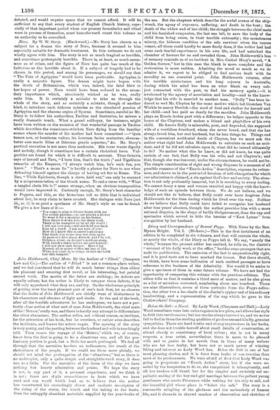John Holdsworth, Chief Mate. By the Author of "Jilted." (Sampson
Low and Co.)—The author of "Jilted " is not a common-place writer, and we feel convinced that he will do much better things than either his pleasant and amusing first novel, or his interesting, but painful second work. The merits of the latter are striking ; its defects are equally salient, but the writer is likely to conquer those defects, if he will only apprehend what they are, and try. On the wholesome principle of getting over the least pleasant part of one's task first, let us observe that the faults of John Holdsworth are chiefly want of distinctness in his characters and absence of light and shade. At the end of the book, after all the terrible adventures he has undergone, we have not a per- fectly clear notion of what sort of man John Holdsworth, the chief mate of tho ' Meteor,' really was, and there is hardly any attempt to differentiate the other characters. The author relies, not without reason, on incident, for the attraction of his book, but he overdoes, or rather over-describes the incidents, and leaves the actors vague. The opening of the story is very pretty, and the parting between the husband and wife is touchingly told. Then comes the voyage of the ' Meteor,' which we, of course, know from the first is going to be a disastrous one, and all the pre- liminary portion is good, but a little too much prolonged. We feel all through that the narrative borders on tediousness, the result of the sketchiness of the people. If wo could see them more plainly, we should not mind the prolongation of the "situations," but as there is no under-plot, only a quite simple and straightforward story, it does vex us a little. For the narrative of the doom of the ship we have nothing but hearty admiration and praise. We hope the story is not, in any part of it, a personal experience, and we think it is not ; there are slight resemblances to facts which we have road and can recall which lead us to believe that the anther has constructed his exceedingly clever and realistic description of the rising of the storm, the wreck and the taking to the boats, from the unhappily abundant materials supplied by the year-books of the sea. But the chapters which describe the awful scenes of the ship- wreck, the agony of exposure, suffering, and death in the boat ; the death of the widow and of her child; the struggle between the chief mate and his famished companion, the last one left, to save the body of the child from being eaten, in their terrible extremity ; the monotonous misery, the hideous condition of the sole survivor when the rescue comes; all these could hardly be more finely done, if the writer had had some each fearful experiences in his own life, and had unlocked the chamber of horrors for us and revealed them. John Holdsworth's loss 1.- of memory reminds us of an incident in Mrs. Cashel Hoey's novel, "A Golden Sorrow," but in this case the blank is more complete and the restoration is more sudden. Admiring the novel so much as we do admire it, we regret to be obliged to find serious fault with its morality on one essential point. John Holdsworth returns, after his terrible misfortunes and his long sojourn in Australia, during which his mind has been an utter blank on every sub- ject connected with the past, to find his memory again ;—it is awakened by the agency of association and locality—and to the know- ledge that his wife is married to another man. "Dolly " has been in- duced to wed Mr. Clayton by the same motive which led Gretchen Van Winkle to marry Derrick—the need of food and shelter for herself and her child—and has paid as dearly for the sacrifice. John Holdsworth plays an Enoch-Arden part with a difference ; he lodges opposite to the house of the Claytons, and makes a friend and playfellow of his own child. He knows Dolly is miserable, poor, and degraded, the supposed wife of a worthless drunkard, whom she never loved, and that she has always loved him, her real husband, but he lets things be. Things end in the convenient accidental death of Clayton, but we must ask the author what right had John Holdsworth to calculate on such an acci- dent, and if he did not calculate upon it, what did he intend ultimately to do? No matter what else he knew, or did not know, he was quite certain of one fact, that Dolly was his wife, and not Clayton's ; and that, though she was innocent, under the circumstances, he could not be. The simple consideration of right and wrong disposes in a moment of all possible romance of the "Enoch-Arden " description, exposes its rotten- ness, and shows us in the pretended heroism of self-abnegation for which our admiration is claimed, a sin against God's law and society. The situa- tion is not only profoundly immoral, but it is revolting to every feeling. We cannot fancy a man and woman reunited and happy with the know- ledge of such an episode between them. We do not believe, and wo should not like to believe, that Dolly could ever have forgiven John Holdsworth for the time during which he lived over the way. Neither do we believe that Dolly could have failed to recognise her husband after four years' absence, though the author provides him with a more rational disguise, in the shape of bodily disfigurement, than the cap and spectacles which served to hide the heroine of "East Lynne" from recognition by her husband.






































 Previous page
Previous page